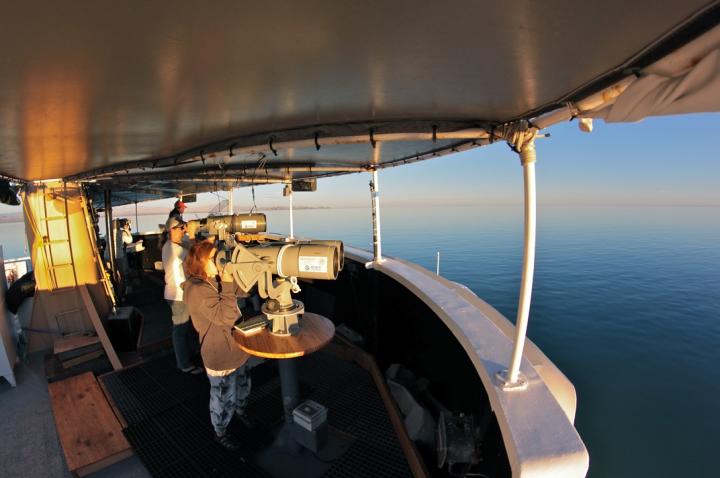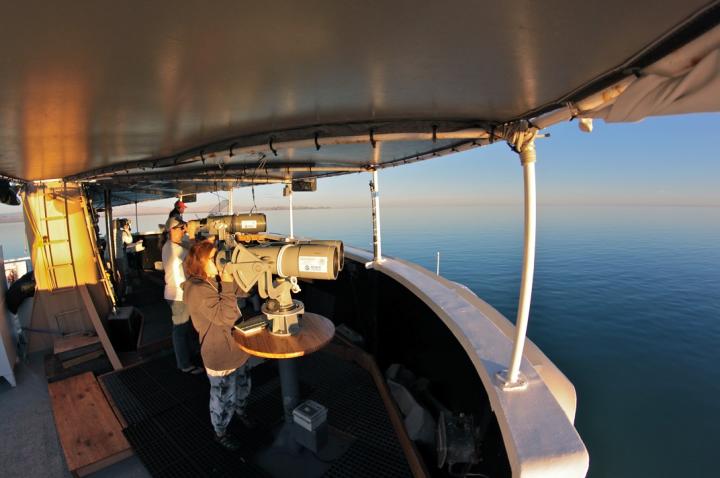
Credit: NOAA Fisheries/Barbara Taylor
One of the most sophisticated networks of acoustic detectors ever developed for wildlife science has documented a devastating 34 percent per year decline of Mexico's critically endangered vaquita porpoise, according to a new study published this week in the journal Conservation Biology.
A companion paper published in Conservation Letters uses both acoustic and visual surveys to estimate that only about 60 vaquitas remained, as of last year.
"We are witnessing the end of a species, if the illegal fishing continues," said Armando Jaramillo-Legorreta of Mexico's Department of the Environment and Natural Resources (SEMARNAT) and lead author of the research describing the acoustic array and its findings. "The acoustic array is a powerful new tool that helps us see the tragic direction of this population by listening for the porpoises' voices."
Intense fishing that began in the 1940s for totoaba, a large fish whose swim bladder is highly prized in China, had driven both species onto the endangered list by the 1980s – the totoaba as the fishery's target and the vaquita as an unintended bycatch.
To save the vaquita, the Government of Mexico has set aside half of the small porpoise's range as a no-fishing refuge and implemented a two-year ban on all gill net fishing in the range of the species. The government is compensating local fishers and related industries at a cost of about $74 million. Scientists and government officials hoped that these actions would reverse the decline.
"The science revealing the decline was key to spurring the Government's emergency actions," said Rafael Pacchiano, Mexico's Secretary of the Department of the Environment and Natural Resources (SEMARNAT).
Instead, the new acoustic study found that the decline has accelerated along with a resumption of illegal gillnet fishing for totoaba. Totoaba bladders are now worth up to $5,000 per kilogram and can command as much as $100,000 on the black market in China, according to a report released last month by the Environmental Investigations Agency.
"Long-term monitoring like this is usually about as newsworthy as an annual check-up," said Barbara Taylor, a NOAA Fisheries marine mammal biologist and coauthor of the new study. "In this case the monitoring exposed the shocking degree of illegal fishing that is rapidly driving the vaquita toward extinction. The science is showing us the urgency of the situation."
Unfortunately, vaquitas continue to die in totoaba nets despite the valiant efforts by law enforcement agencies, the Mexican Navy, and conservation groups to prevent illegal fishing since the gillnet ban came into effect in April 2015, immediately before the new acoustic and visual studies were launched. Three vaquitas killed in gillnets were recovered during surveillance activities last spring and alarming quantities of totoaba gill nets have been found and removed in recent months. A new abundance estimate using acoustic monitoring that builds on last year's abundance estimate is expected out soon.
"This pioneering research revealed just how sharply vaquitas are declining, and how urgent the situation has become," said Cisco Werner, director of NOAA Fisheries' Southwest Fisheries Science Center. "Science may have bought the vaquita some precious time by supporting the extra protections. But we are now on the verge of losing the species altogether."
###
Media Contact
Michael Milstein
[email protected]
503-231-6268
@NOAAFish_WCRO
http://www.westcoast.fisheries.noaa.gov/index.html
############
Story Source: Materials provided by Scienmag





